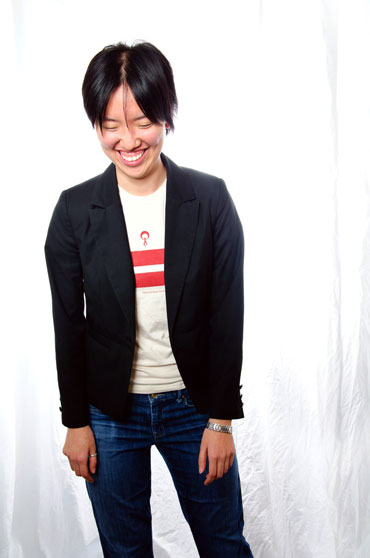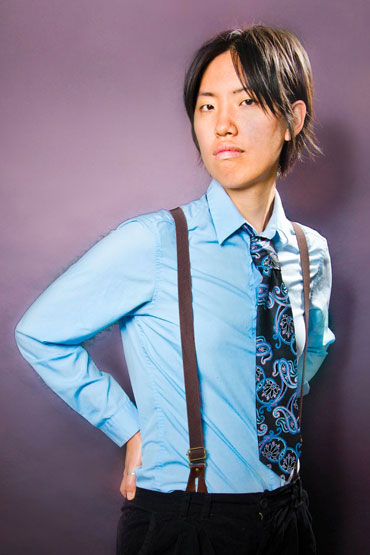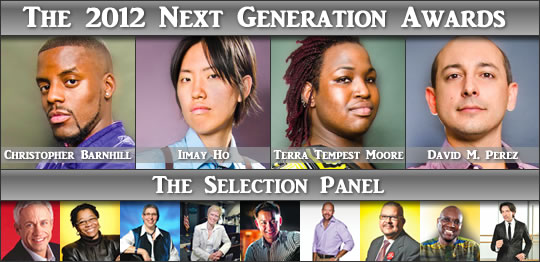Iimay Ho remembers one of the first times direct activism paid off for her.
While a junior in high school, one of her classmates drew a Chinese man during a discussion of Confucianism. ''Basically, straw hat, fortune cookie,'' she recalls. ''Any kind of offensive Orientalist things you could think of were on that poster.''

Iimay Ho
(Photo by Julian P. Vankim)
''I actually spoke out against it,'' Ho says. Her teacher supported her and had her talk to the offending artist and the entire class. ''I even got to write an angry spoken-word poem about it,'' Ho chuckles. ''That was probably one of the first times I felt like I said something that had mattered.''
Later, Ho would unsuccessfully try to start a gay-straight alliance in her North Carolina high school. The only hitch? Her gay friends weren't as eager for the alliance as she was – and Ho wasn't out yet. ''In high school I was straight,'' she laughs, ''I was just a really great ally.''
Ultimately, it wasn't until Ho graduated from college and moved to the D.C. area that she was fully able to connect the dots between her college-nurtured queer identity and her Chinese-American heritage. The week after she moved to the area, for a job with the Organization of Chinese Americans, Ho went to a picnic put on by the Asian/Pacific Islander Queer Sisters (APICS) and Asian Queers United for Action (AQUA).
''I just remember feeling really welcome and awestruck realizing I'm not the only one – I'm not the only queer Asian American,'' she says. From that moment, roughly four years ago, the 26-year-old Ho says, ''It's just been really important for me to work with other people like me to increase our visibility and advocate for issues that affect our lives.'' Since then, Ho has served as the volunteer LBT issues chair of the DC Chapter of the National Asian Pacific American Women's Forum and helped organize the annual queer Asian event Pride & Heritage. She also recently co-founded the Rainbow Dragon Fund, billed as the nation's first ''queer Asian/Pacific Islander American giving circle.''
In recognition of Ho's dedication to and leadership of her community, she's one of this year's Metro Weekly Next Generation Award recipients.
''It's a huge honor to know that I have this kind of community support,'' she says. ''To be honored in this way it feels like a queer Asian family is looking out for me. They've been such a central part of my D.C. home. Growing up in North Carolina, I didn't really have a strong Asian American community, much less a strong queer Asian American community.''
In fact, cultivating community support has been something of a long road for Ho. ''Some of my earliest childhood memories were actually being teased for being Asian,'' she says. ''People would pull their eyes up into slants, or call me names. I felt pretty early on that people didn't think I belonged or that I was foreign.''
Ho is decidedly not foreign. While her parents immigrated to the U.S. from Taiwan – where Ho's grandparents, in turn, had fled to escape China's civil war – Ho was born Sherry Iimay Ho in Cary, N.C. But unlike her brothers Ben and Michael, Ho's parents never called their middle child by her given English name, preferring Iimay, pronounced ''ee-may'' and meaning ''beautiful'' in Mandarin. The friendly, good-natured Ho shrugs off the ribbing she got specifically because of her name. ''You know, that's inevitable,'' she says.

Iimay Ho
(Photo by Julian P. Vankim)
Part of Ho's dedication to her community stems from seeing her parents make their own way – her mother as an insurance agent specifically serving Chinese-speaking immigrants, her father as an executive at an engineering company. Because of their success, Ho enjoyed an upper-middle-class upbringing and a good education. ''Definitely having class privileges sort of mitigated my experiences of racism,'' says Ho, likely informed by the sociology degree she earned from the University of North Carolina at Chapel Hill. ''[But] it was a really formative experience just feeling like I always had to prove something, or prove I belong, or that I'm really a Southerner.''
Looking at another juncture of social interactions, Ho had it relatively easy coming out to her parents.
''My mom actually knew other Chinese lesbians and Chinese gay folk, so she didn't feel like she was the only one struggling,'' she explains. Ho laughs when relating her mother's main concern after she came out: ''Are you going to start dressing like a man now?'' Ho came out to her father later, and his concern was more about how being gay might negatively impact her life. ''That's something I've tried to stress to my parents,'' she says, ''how much being queer, being a lesbian, has actually enriched my life, or really allowed me to be all that I can and to have this really strong community.''
Ho's parents are accepting of her partner, whom they first met when she was one of Ho's housemates her senior year of college. Four years later, the couple lives together in a condo in Arlington. And Ho's mother has become something of a gay rights activist – specifically organizing against Amendment 1 in North Carolina, the extreme ballot measure that would legally restrict any domestic arrangement between two people, even civil unions, to only one man and one woman. Ho says her ''mom is trying to get a yard sign'' against Amendment 1, which is up for vote May 8.
By day, Ho is the operations manager of The Management Center, which provides management consulting to progressive nonprofits. Ho intends to continue working for the general progressive cause, and she sees the Next Generation Award as a helpful push for bigger and better things in her volunteer work.
''I sort of feel the weight of responsibility of what the award means,'' she says. ''I think it makes me more of a representative for the queer Asian American community.
''It's a charge to keep doing good work.''
 ...more
...more